- About Us
- Columns
- Letters
- Cartoons
- The Udder Limits
- Archives
- Ezy Reading Archive
- 2024 Cud Archives
- 2023 Cud Archives
- 2022 Cud Archives
- 2021 Cud Archives
- 2020 Cud Archives
- 2015-2019
- 2010-2014
- 2004-2009
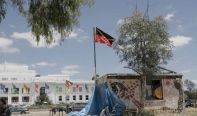 |
February 2012 - Refugees In Their Own Land |
Politics is as much about symbols as substance. Observers should remember this principle when trying to understand the events at Canberra’s Lobby Restaurant on Australia Day, 2012. Mainstream media reports have lacked objectivity, but it is hardly a new tendency among media, particularly commercial outlets, to sensationalise minor incidents, foster public panics and fail to achieve balance.
Eureka Street columnist Father Frank Brennan admitted feeling confusion and concern. Brennan recognises that media over-simplify complex situations. He has written extensively on human rights issues including the treatment of asylum seekers and has been such a strong advocate for Aboriginal advancement that one Prime Minister called him a ‘meddlesome priest’.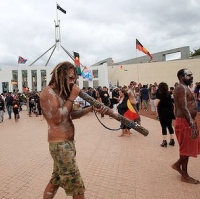 Brennan knew that the Australia Day story needed further investigation and so approached the Aboriginal Tent Embassy on the lawns of Old Parliament House. By contrast, many observers have framed events according to their prejudices about Indigenous Australians.
Brennan knew that the Australia Day story needed further investigation and so approached the Aboriginal Tent Embassy on the lawns of Old Parliament House. By contrast, many observers have framed events according to their prejudices about Indigenous Australians.
Australia Day is celebrated on a controversial date. The first British Governor unilaterally hoisted the Union Jack on 26 January 1788. Many Australians outside New South Wales think the date too Sydney-centric and many who were born overseas or who have a parent or two who immigrated find the British emphasis too narrow. Indigenous Australians are hostile to a day that commemorates the invasion of their land and hold alternative celebrations of their survival.
The Australian state is very young. In comparison with the 40,000 years of Indigenous custodianship, white occupation has been brief. Most living Australians were born in the twentieth century, and the opening of the first federal parliament in 1901 seems relatively recent. Yet when the session opened, the reply to the royal address was given by a man who had been transported to Australia as a convict. While twentieth century politics is so well documented that it seems modern and transparent, the transportation period is hidden in the mists of history. This direct link between colonial times and federal politics surprises many observers. It is also significant that the written federal constitution of 1901 is brief and omits many important institutions. The Prime Minister is not mentioned and political parties achieved a tangential recognition in the 1970s. Although the Constitution has been difficult to amend, it seems clear that the founders expected that development would occur naturally.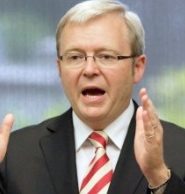 So it is appropriate that such a young state – we should hesitate about using the term ‘nation’ – should debate its identity, and Australia day stimulates such debates annually. Some Australians celebrate larrikinism, resourcefulness, egalitarianism, anti-authoritarianism, sportsmanship and humour while others criticise the masculinism in mateship, wowserism, racism, sectarianism, conservatism, laziness and greed.
So it is appropriate that such a young state – we should hesitate about using the term ‘nation’ – should debate its identity, and Australia day stimulates such debates annually. Some Australians celebrate larrikinism, resourcefulness, egalitarianism, anti-authoritarianism, sportsmanship and humour while others criticise the masculinism in mateship, wowserism, racism, sectarianism, conservatism, laziness and greed.
It is also appropriate that the date itself should be debated. An early action of the Rudd Labor Government elected in late 2007 was to formally apologise to the Stolen Generations of Indigenous peoples. Successive governments had forcibly removed children from Aboriginal families, allegedly for protection, damaging thousands of lives forever. The apology was overdue, very welcome and so moving that people of goodwill suggested that the anniversary on 13 February would be a more unifying date for a truly ‘national’ day.
Regardless of interpretations of the Lobby restaurant events, there are some agreed facts.
1. The Tent Embassy has operated since the 1970s as a reminder of the outsider status of Aboriginal peoples.
2. On Australia Day morning, Coalition and Opposition Leader Tony Abbott questioned the Embassy’s continuing relevance.
3. Prime Minister Julia Gillard and Mr Abbott visited the Lobby Restaurant.
4. A staffer in the PM’s office let media know that Mr Abbott would be in the vicinity of the Tent Embassy.
5. Protestors from the Embassy demonstrated outside the restaurant.
6. Federal police in charge of the PM’s security decided to remove her from the scene.
7. As the PM and Mr Abbott were bustled away, the PM lost a high-heeled shoe.
8. Media published an embarrassing photograph of the PM falling against a policeman.
9. The PM’s staffer was sacked.
10. Media ran a very one-sided campaign hostile to the Tent Embassy.
11. Some Indigenous spokespersons condemned the protests.
12. The Opposition called for further investigations.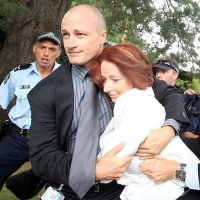
The Tent Embassy has been an important institution. While there has been some improvement in the lives of Indigenous peoples, key social indicators show that they remain disadvantaged by comparison with non-Indigenous Australians. They are more likely to have poor diets, die younger, drop out of school, suffer preventable illness and to be unemployed, incarcerated and inadequately housed. Successive Labor and Coalition Governments have made slow progress in addressing these gaps. By attempting to score points and wrong-foot their opponents, politicians have failed to establish the bipartisanship needed for reform to succeed. For their own political convenience they have oscillated between ‘practical’ and ‘symbolic’ measures. They have criticised their opponents for ‘throwing money at the problem’ while boasting of their own spending which always allocates resources according to their own ideological preferences.
Whether their aim has been to address Indigenous disadvantage or just to defuse the issue mainstream politicians have tried to bring Indigenous spokespersons inside the government’s mechanisms. The Tent Embassy has remained outside the process and served as a constant reminder that the notion of Aboriginal sovereignty has not been addressed. There has been no treaty, for example, to end the process of invasion and the period of wars and genocide that entrenched British rule. In the area where I live, Windradyne resisted white invasion in some bloody skirmishes, but only after attempting to deal moderately with the Governor.
The current orthodoxy in this policy area is the Reconciliation process, which is an attempt to enable black and white Australians to participate together in the campaign for Indigenous advancement. Coalition preference has been towards ‘practical reconciliation’ implying that Labor favours actions that are merely symbolic. Unfortunately, the Coalition’s recent history in this policy area is not impressive. Indigenous delegates turned their backs on Prime Minister Howard at an important conference.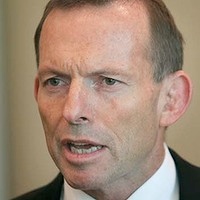 The Coalition introduced ‘intervention’ in the Northern Territory, where the federal government has jurisdiction and ‘quarantined’ welfare payments - for Aboriginal people only. Some Coalition MPs supported the Apology to Stolen Generations only reluctantly.
The Coalition introduced ‘intervention’ in the Northern Territory, where the federal government has jurisdiction and ‘quarantined’ welfare payments - for Aboriginal people only. Some Coalition MPs supported the Apology to Stolen Generations only reluctantly.
While Mr Abbott’s comments about the Tent Embassy seemed moderate enough, his party’s recent relationships with Aboriginal people ensured that his remarks were regarded as hostile. Coalition spokespersons over the last two decades have been accused of using ‘dog whistle’ tactics - making apparently innocuous comments underlain with encouragement to extremists. Mr Abbott’s comments implied that it is time for Indigenous people to ‘move on’, because outstanding issues from the past have been resolved. He positioned protestors as unsatisfiable whingers.
The media which created the panic over the protest contacted various Aboriginal spokespersons for comment. It is unclear whether any declined to comment or expressed support for the protestors, but the views of those critical of the protestors were disseminated enthusiastically. Nothing encourages white prejudice as effectively as black disunity. Those critical of the role of the Tent Embassy were individuals who have decided to work within non-Indigenous institutions such as political parties, the bureaucracy and semi-judicial institutions. White Australia would characterise these individuals as ‘moderates’, which reinforces the idea that the Embassy encourages extremists.
Far from being a haven for extremists, the Tent Embassy has borne mostly silent witness to the events of the last four decades in Canberra. When we discarded Old Parliament House, people from the Tent Embassy moved in and claimed it. Despite there being an understanding that Aboriginal land rights could be claimed on unoccupied crown land, these people were taken into police custody. The Embassy moved to Sydney during the 2000 Olympic Games and its presence drew international attention to the Indigenous cause.
Prime Minister Gillard’s image was damaged by the actions of her security officers. Although both the Federal Police and the Government expressed satisfaction with the performance of the security officers, a high degree of tolerance is expected towards protests in a democracy. Australian political leaders have never found high security necessary to protect their personal safety, and officers have always done a quiet, unobtrusive but effective job. Previous prime ministers have received coatings of eggs, flour and fruit without making a great fuss. It would be detrimental to democratic practices should the culture of the security services become more aggressive as a result of perceptions about international terrorism. The slide into a police state is all too easy.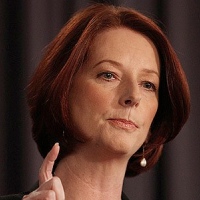
Whether or not the security services over-reacted on this occasion will remain a matter for speculation. What is clear is that the manner in which Prime Minister Gillard was protected presented an embarrassing image. Archie Roach’s famous song about police forcibly removing children from their parents could easily be amended so that the lyrics lament the taking away of the prime minister. While the Opposition Leader walked away calmly, Ms Gillard was bustled so that she lost a shoe, causing her to fall. Afterwards, media reported some people at the Tent Embassy as saying that they had the shoe and would like ‘Gingerella’ to retrieve it so that they could speak with her.
The image of a prime minister being treated like a rag doll will not increase her respect in the electorate. During election campaigns, media seize on small slips as signs of loss of control. On this occasion, Ms Gillard appeared vulnerable. Women politicians have noted that one element of their different treatment relates to the ability to recover from mistakes. Generally, male politicians can lose their seats, be removed from the ministry and make personal blunders but receive second chances. The experience with female politicians is that they make one error and their careers are over.
Female politicians and Indigenous people are both judged by standards that are impossible to meet. If they passively wait for benefits of some kind to be handed to them they are condemned for being lazy and unrealistic. If they are pursue their rights assertively then they are branded as aggressive. In the current political climate, this could be a crucial time for Indigenous advancement. There are proposals for recognition of the special status of Indigenous people in the Constitution and suggestions about a Treaty. 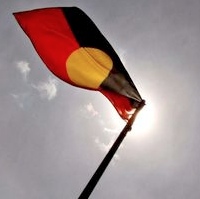
Constitutional amendment requires popular approval and would depend upon the particular wording. The lesson from the attempt to introduce an Australian Head of State as a step towards republicanism is that opponents of reform are adept at splitting the proponents when it suits their cynical purposes. While the 1967 referenda (to include Aboriginal people in the census and to grant the Commonwealth Government power to legislate for Aboriginal advancement) passed with record majorities, it has been remarked that the political climate today is more hostile and that success might not be guaranteed. Failure of a referendum today would be disastrous.
With a few exceptions, notably New Matilda which referred to a ‘beat-up’, Australian media reported the events of Australia Day very poorly. Conservative commentators attempted to keep the issue rolling for their own unethical purposes. Protest by definition needs to surprise. It must stand outside the mainstream. Protestors need to retain the initiative and to resist governments that try to focus demands in ways that are politically convenient. While Indigenous Australians lack official recognition as the rightful custodians of the land and while the social gap between Indigenous and non-Indigenous Australians remains such a disgrace, the Tent Embassy performs a vital function. To deny its relevance is paternalistic and repeats the kinds of mistakes that have placed Indigenous Australians at such deplorable disadvantage.
